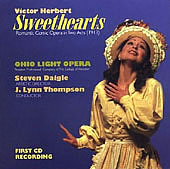
SWEETHEARTS
A musical play in 2 acts; Music by Victor Herbert; Lyrics by Robert B. Smith; Book by Harry B. Smith & Fred de Gresac.
Revised version: New Book and lyrics by Phil Park; Music adapted and arranged by Ronald Hanmer.
New Amsterdam Theatre 8 September, 1913 (136 perfs)
Synopsis
The story of the operetta is founded on the adventures of Princess Jeanne, daughter of King René of Naples, who reigned in the 15th Century. Time has been changed to the present (1913), and the locale to the ancient city of Bruges, to which the little Princess has been carried to safety in time of war. There she has been given the name of Sylvia. As an infant she is found in the tulip garden one morning by Dame Paula, who runs the Laundry of the White Geese and who is known as Mother Goose. Sylvia is brought up as the daughter of Paula, although she later has six daughters of her own ...
Mikel Mikeloviz, disguised as a monk, left Sylvia when an infant in Dame Paula's care. Knowing that Sylvia is the Crown Princess of the little kingdom of Zilinia, Mikel is conspiring to restore her to the throne, which is about to be offered to Franz, the heir presumptive, who, in travelling incognito, has fallen in love with Sylvia and who finds a rival in Lieutenant Karl, a military lothario, betrothed to Sylvia. Mikel's plans are endangered by the schemes of three villains. Furthermore, Liane, a milliner has sought temporary employment in the Laundry of the White Geese, and is mistaken by Mikel for the lost princess.
Of course, it all ends happily with Franz and Sylvia marrying and vowing to rule together.
Songs:
(Original production - in alphabetical order)
Angelus
The Cricket On the Hearth
Every Lover Must Meet His Fate
For Every Lover
Game Of Love
Hail, Franz of Zilinia
I Don't Know How I Do But I Do
I Might Be Your Once-in-a-While
In the Convent They Never Taught Me That
Iron, Iron, Iron
Mother Goose
On Parade
Pretty As A Picture
Smiles
Sweethearts (If You Ask Where Love Is Found)
There Is Magic In A Smile
Waiting For the Bride
Musical Numbers - Revised production
ACT I
OVERTURE
- OPENING—ACT I (The Goslings and Paula) - Iron! Iron! Iron!
- SEPTET (Karl, Goslings with Chorus) - On Parade
2a EXIT OF CHORUS - SONG (Liane and Chorus) - Magic in a Smile
- SONG (Karl and Goslings) - The Game of Love
4a ENTRANCE OF SYLVIA - SONG (Sylvia and Chorus) - Sweethearts
5a ENTRANCE OF FRANZ - SONG (Franz and Chorus) - Ev'ry lover must meet his Fate
- DUET (Liane and Felix) - Life is what you make it
- DUET (Sylvia and Franz) - Indian Summer
- FINALE—ACT I (Ensemble)
- ENTR'ACTE
ACT II
- OPENING CHORUS (Ensemble) - Handsome Pair
- BALLET
- CHORUS REPRISE (Ensemble) - Handsome Pair
- SEPTET (Paula and Goslings) - Now you're in Society
- SONG (Franz and Chorus) - Pretty as a Picture
15a BALL ROOM WALTZ MUSIC - DUET (Liane and Karl) - Talk about this—talk about that
- SONG (Slingsby and Chorus) - I don't know how I do it, but I do!
- DUET REPRISE (Sylvia and Karl) - Sweethearts
- REPRISE (Franz and Chorus) - Indian Summer
19a ENTRANCE OF THE MONKS - TRIO (Slingsby, Leo and Theo) - Pilgrims of Love
- FINALE—ACT II (Ensemble)
- FIRST CURTAIN CALL (Ensemble) - Indian Summer
- SECOND CURTAIN CALL (Ensemble) - Pretty as a Picture
- PLAY-OUT
CAST
9 female, 6 male
PAULA - Proprietress of the White Geese Hotel
The Goslings her daughters
JEANNETTE
CLAIRETTE
BABETTE
LISETTE
TOINETTE
NANETTESYLVIA - An adopted daughter
LIANE - A milliner
COUNT FRANZ VON HOLLENSTEIN
LIEUTENANT KARL
FELIX - A likeable rogue
SLINGSBY - A would-be financier
LEO & THEO - Slingsby's cronies
COLONEL LAMARCK - An emissary
Notes on the casting
SYLVIA- Heroine. High soprano.
LIANE — Soubrette. High soprano.
PAULA — Character comedienne. Contralto.
The Goslings
JEANNETTE - Soprano
CLAIRETTE - Soprano
BABETTE -Mezzo-soprano
LISETTE - Mezzo-soprano
TOINETTE - Mezzo-soprano.
NANETTE - Mezzo-soprano
COUNT FRANZ - Hero. High baritone.
LIEUTENANT KARL - Military Lothario. High baritone.
FELIX - a slick schemer, light comedian. Light baritone. SLINGSBY
- Character comedian. Light baritone.
L EO - Baritone.
THEO - Bass-baritone.
NON-SINGING: COLONEL LAMARCK.
Scenes and settings
Period: Early 20th Century.
ACT I—Forecourt of the White Geese Hotel, Blatz, Switzerland.
ACT II—Salon of the Chateau Hollenstein.
Instrumentation:
Revised version for amateur performance adapted by Ronald Hanmer, new book and lyrics by Phil Parkflute, oboe, 2 clarinets, bassoon, 2 horns, 2 trumpets, 2 trombones, percussion, harp, strings
IN the new version of Sweethearts, the orchestration has been carefully arranged to meet the requirements of modest or large orchestras.
The minimum combination for an effective performance is: Flute; 1st B flat Clarinet; 1st and 2nd Trumpets; 1st Trombone; Percussion and Strings. Thereafter, instruments should be added in the following order: 2nd B flat Clarinet; Oboe; 2nd Trombone; Bassoon; 1st and 2nd Horns and lastly, Harp.
The work is liberally cued. In the absence of the Oboe, the 1st Trumpet should play these cues muted. Oboe cues are doubled in Flute and Clarinet where practicable, and Horn and Bassoon cues appear in Cello, Trombone and Trumpet parts. It is emphasized that a complete string section should be used, but Clarinet parts contain many essential cues to be played in absence of a Viola. The string parts are bowed where necessary, and the 1st Violin has all important melody cues throughout. The vocal score carries instrumentation marks for the musical director's assistance.